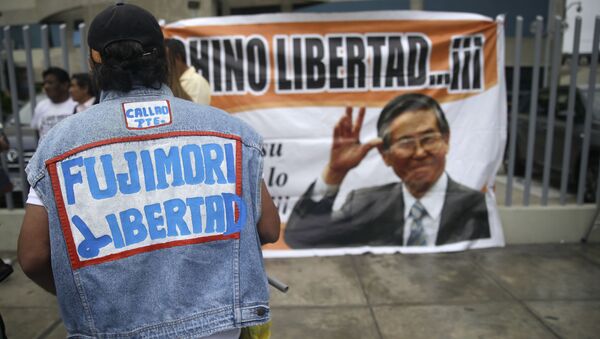The amnesty granted to former Peruvian President Alberto Fujimori by the current leader of the country, Pedro Pablo Kuczynski, is an exchange of civilities, not a transparent process, political scientist David Sulmont, a professor at Pontifical Catholic University of Peru, told Sputnik Mundo.
"The speed at which this step was taken indicates a lack of transparency," Sulmont said. "This is a political decision, the result of an exchange of courtesies, which prompted outrage among opponents of the pardon."
On December 24 Kuchinsky pardoned Fujimori, who was serving a 25-year prison term for corruption, human rights violations and the killing of civilians. According to the presidential administration, the former president was released for health reasons.
The fact that the amnesty was granted to the former Peruvian president three days after the impeachment vote is hardly a coincidence, Sulmont believes.
"Negotiations were held," the political scientist suggested, insisting that the process could be more transparent.
According to Sulmont, Kuczynski's sudden change of heart may result in the recognition of the decision as illegal.
The academic recalled that the incumbent president is seeking to bolster the stability of his government and is trying to get closer to the Fujimori faction Popular Force.
Sulmont believes that Fujimori's pardon won't lead to the removal of the Kuczynski government but will provoke "a final break with some factions which reluctantly supported the president in the second round of elections against Keiko Fujimori and did not allow his ouster several day ago" in the country's Congress.
Fujimori's pardon inflicted losses on Kuczynski's cabinet, as three congressmen announced their resignation: Alberto de Belaunde, Vicente Zeballos, Gino Costa.
"I respect the decision of the president of the Republic to grant the pardon [to Fujimori], but I do not approve of the way it was implemented. I regret that I must declare that in the next few days I will officially depart from Peruanos Por el Kambio (the Kuczynski-led party)," Costa wrote in his Twitter account on December 25.
Respeto la prerrogativa del Presidente de la República de conceder el indulto humanitario, pero no comparto la manera cómo se ha ejercido. Lamento tener que anunciar que en los próximos días formalizaré mi renuncia a la Bancada de Peruanos Por el Kambio.
— Gino Costa (@CostaGino) December 25, 2017
According to Sulmont, opponents of Fujimori will boost their positions in the near future. However, the political scientist is not sure whether they will be able to achieve sustainability.
Fujimori was in office from 1990 to 2000. The former president was accused of corruption and crimes against humanity, including ordering massacres by death squads in 2009 and sentenced to 25 years' imprisonment. The pardoning of the former leader of the country caused controversy within Peruvian society and provoked mass protests in Lima and other cities.
The views and opinions expressed by David Sulmont are those of the speaker and do not necessarily reflect those of Sputnik.





